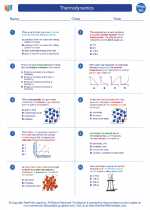Molecular Weight
Molecular weight, also known as molecular mass, is a measure of the total mass of all the atoms in a molecule. It is an important concept in chemistry and is used to calculate various properties of substances.
Calculating Molecular Weight
The molecular weight of a compound is calculated by adding up the atomic weights of all the atoms in the molecule. The atomic weight is the average mass of an atom of an element, taking into account the naturally occurring isotopes.
The molecular weight is usually expressed in atomic mass units (amu) or in grams per mole (g/mol).
Example Calculation
For example, the molecular weight of water (H2O) can be calculated as follows:
Atomic weight of hydrogen (H) = 1.0079 amu
Atomic weight of oxygen (O) = 15.9994 amu
Molecular weight of water = 2(1.0079 amu) + 15.9994 amu = 18.0153 amu
Importance of Molecular Weight
Knowing the molecular weight of a substance is important because it allows us to calculate the amount of a substance needed for a reaction, the concentration of a solution, and various other properties such as density and molar volume.
Study Guide
Here are some key points to remember about molecular weight:
- Molecular weight is the sum of the atomic weights of all the atoms in a molecule.
- It is usually expressed in atomic mass units (amu) or in grams per mole (g/mol).
- Molecular weight is used to calculate the amount of a substance needed for a reaction and other important properties.
- To calculate the molecular weight of a compound, add up the atomic weights of all the atoms in the molecule.
Understanding molecular weight is essential in chemistry and is fundamental to many chemical calculations and analyses.
Hope this helps!
.◂Physics Worksheets and Study Guides High School. Thermodynamics

 Worksheet/Answer key
Worksheet/Answer key
 Worksheet/Answer key
Worksheet/Answer key
 Worksheet/Answer key
Worksheet/Answer key
